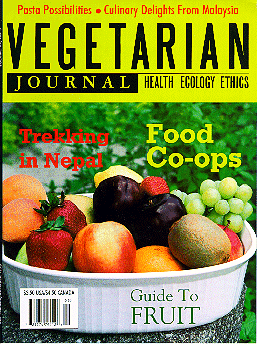
Vegetarian Journal
Excerpts
September/October 1996Volume XV, Number 5


|
Vegetarian JournalExcerptsSeptember/October 1996Volume XV, Number 5
|
In Japan, the incidence of Crohn's disease is higher than in the past. Researchers in Tokyo tried to find a connection between dietary changes in Japan and Crohn's disease as the Japanese adopt a more Western-style diet.
They found that animal protein is the nutrient most strongly associated with the increased incidence of the disease. Total fat, animal fat, milk protein, and fats like linoleic acid were also implicated. Vegetable protein was associated with a reduced incidence of the disease.
While these results are preliminary, it would seem prudent to reduce the amount of animal protein and fat in your diet if your family has a history of Crohn's disease.
Shoda, R., Matsueda, K., Yamato, S., et al. 1996. Epidemiologic analysis of Crohn's disease in Japan: increased dietary intake of n-6 polyunsaturated fatty acids and animal protein relates to the increased incidence of Crohn's disease in Japan. Am J Clin Nutr. 63:741-745.
Obese parents tend to have obese children. In fact, the probability of a child becoming obese has been estimated to be 80% if both parents are obese. In contrast, the probability of a child becoming obese if neither parent is obese is only 7% and if one parent is obese it is 40%. What explains this tendency of children to resemble their parents?
While many factors are involved, a study of 71 children 4 to 7 years old found that children of obese mothers had higher fat intakes than children whose mothers were not obese. These larger fat intakes appeared to lead to more body fat in boys.
Nguyen, V.T., Larson, D.E., Johnson, R.K., et al. 1996. Fat intake and adiposity in children of lean and obese parents. Am J Clin Nutr; 63:507-513.
A recent study examined how well zinc was absorbed during periods of low intake. Young women in rural China ate a mainly vegetarian diet. Eggs were used occasionally. Their zinc intakes were about 1/2 the recommended level for women in the US. Study subjects appeared to be able to make up for low zinc intakes by reducing zinc losses in feces.
We do not know if this adaptation to low zinc intakes would also be seen in individuals whose childhood diets were higher in zinc and whose diets later in life were low in zinc. Additionally, we do not know if these young women would be able to compensate for low zinc intakes during periods of increased need, like pregnancy and breastfeeding.
Sian, L., Mingyan, X., Miller, L.V., et al. 1996. Zinc absorption and intestinal losses of endogenous zinc in young Chinese women with marginal zinc intakes. Am J Clin Nutr; 63:348-353.
Thanks to volunteer Jeanie Freeman for converting this article to HTML
|
||||
| Last Updated September 20, 1997 |
Graphic design by | 
|
||
| The contents of this web site, as with all The Vegetarian Resource Group publications, is not intended to provide personal medical advice. Medical advice should be obtained from a qualified health professional. Any pages on this site may be reproduced for non-commercial use if left intact and with credit given to The Vegetarian Resource Group. Web site questions or comments? Please email [email protected]. |
||||